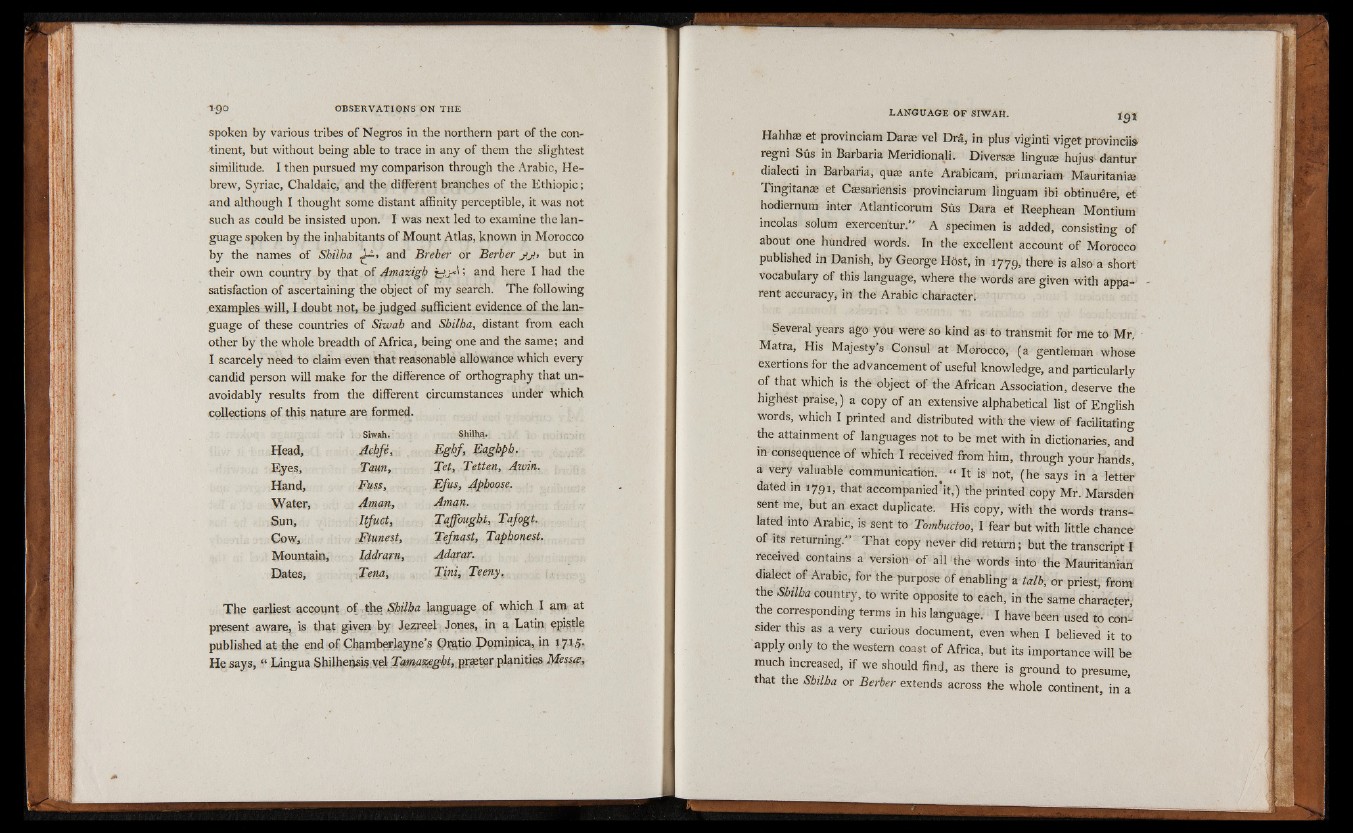
spoken by various tribes of Negros in the northern part of the continent,
but without being able to trace in any of them the slightest
similitude. I then pursued my comparison through the Arabic, Hebrew,
Syriac, Chaldaic, and the different branches of the Ethiopic;
and although I thought some distant affinity perceptible, it was not
such as could be insisted upon. I was next led to examine the language
spoken by the inhabitants of Mount Atlas, known in Morocco
by the names of Shilha > and Breber or Berber j i j , but in
their own country by that of Amazigb fa'wij’ and here I had the
satisfaction of ascertaining the object of my search. The following
examples will, I doubt not, be judged sufficient evidence, of the. language
of these countries of Siwab and Sbilba, distant from each
other by the whole breadth of Africa, being one and the same; and
I scarcely need to claim even that reasonable allowance which every
candid person will make for the difference of orthography that unavoidably
results from the different circumstances under which
collections of this nature are formed.
Siwah» Shilha.
Head, Acbfe, Egbf, Eagbpb.
Eyes, Tarn, Tet, Tetten, Awin,
Hand, Fuss, Ejus, Apboose.
Water, Aman, Aman.
Sun, Itfuct, Taffougbt, Tafogt.
Cow, Ftunest, Tefnast, Tapbonest.
Mountain, Iddram, Adarar.
Dates, Tern, Tini, Teeny.
The earliest account of the Sbilba language of which I am at
present aware, is that given by Jezreel Jones, in a Latini epistle
published at the end of CfiambeFlayne’s Qratio Ppmmica, in 1715,
He says, “ Lingua Shilheijsis. vel Tamazegbt, praster planities Mess.#,
Hahhæ et provinciam Daræ vel Drâ, in plus viginti viget provinciis
regni Sûs in Barbaria Meridionah. Diversæ linguæ hujus dantur
dialecti in Barbaria, quæ ante Arabicam, primariam Mauritaniæ
Tingitanæ et Cæsariensis provinciarum linguam ibi obtinuére, et
hodiernum inter Atlanticorum Sus Darà et Reephean Montium
incolas solum exercentur." A specimen is added, consisting of
about one hundred words. In the excellent account of Morocco
published in Danish, by George Hast, in 1779, there is also a short
vocabulary of this language, where the words are given with apparent
accuracy, in the Arabic character.
Several years ago you were so kind as to transmit for me to Mr,
Matra, His Majesty’s Consul at Morocco, (a gentleman whose
exertions for the advancement of useful knowledge, and particularly
of that which is the object of the African Association, deserve the
highest praise,) a copy of an extensive alphabetical list of English
words, which I printed and distributed with the view of facilitating
the attainment of languages not to be met with in dictionaries, and
in consequence of which I received from him, through your hands,
à very valuable communication. ^ “ It is not, (he says in a letter
dated in 1791, that accompanied it,) the printed copy Mr. Màrsden
sent me, but an exact duplicate. His copy, with the words translated
into Arabic, is sent to Tombuctoo, I fear but with little chance
of its returning." That copy never did return ; but the transcript I
received contains a version o f all thé words into the Mauritanian
dialect of Arabic, for the purpose of enabling a talb, or priest, from
the Shilha country, to write opposite to each, in the same character,
the corresponding terms in his language. I have been used to con-
sider this as a very curious document, even when I believed it to
apply only to the western coast of Africa, but its importance will be
much increased, if we should find, as there is ground to presume,
that the Sbilba or Berber extends across the whole continent, in a